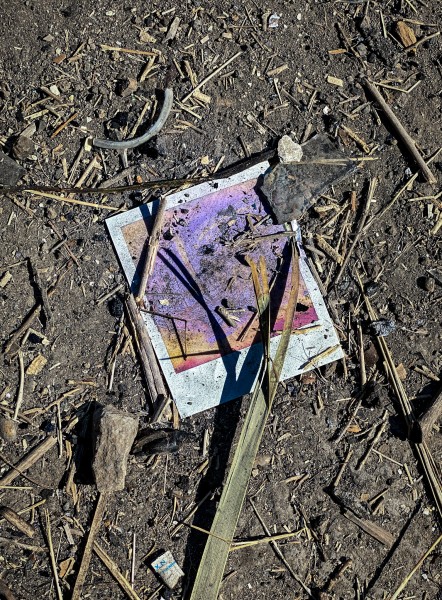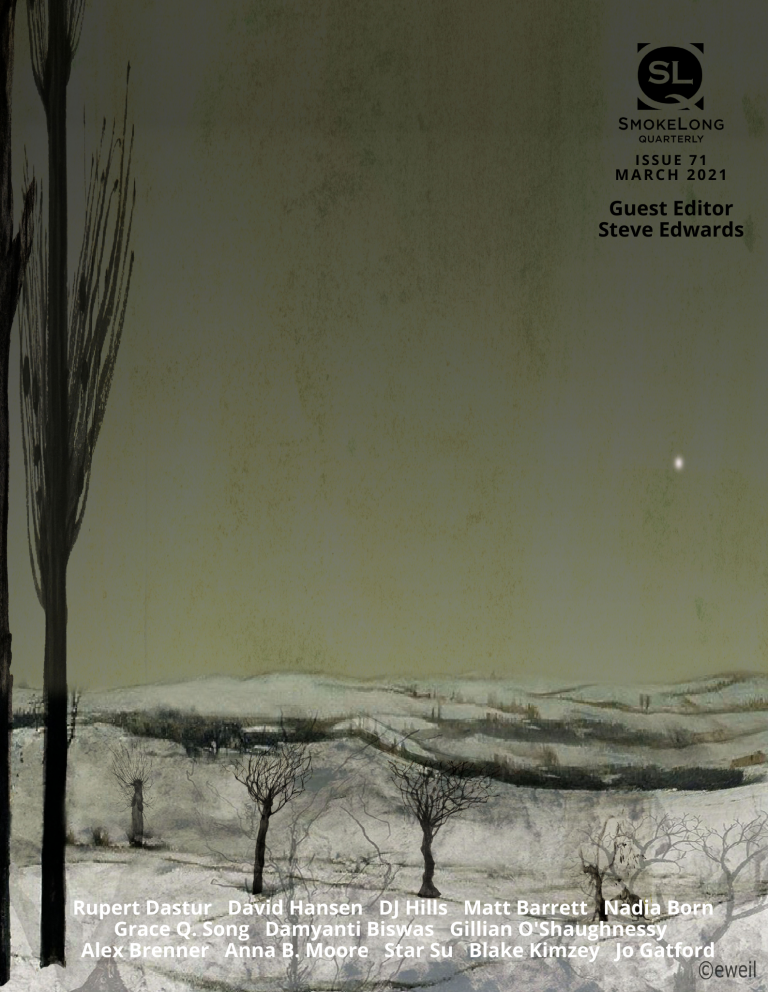Rusted, windswept trailers like my own and the one-pump gas station were the only proof that anyone attempted life out here. Everyone chased flying saucers—that was the draw.
It was an act of defiance living this far out: a form of punishment for the Postal Service, making them deliver junk mail 116 miles from anything resembling civilization. But here we were, a place I had known and left and known again. When you leave, it is the sulfur perfume you miss, a lazy jet stream of heavy, foul air that draws you back, the likes of which I couldn’t get in Flagstaff. Only after my daughter and her boyfriend were killed on the way home from prom in a head-on along I-40 a decade ago did I move back.
Cars came and went on the weekends, mostly. Stargazers. Lovers. Astronomers. Druggies. Conspiracy Theorists. I liked to sit on my front porch and watch them approach and retreat, a line of headlights coming south and redtails heading north. Just me and them, an heirloom afghan on my lap and boxes of Virginia Slims to ash my lungs. But people also came out here to die. To end their lives under the beauty of the stars, under the mystery of a spinning UFO. And I found one such girl bleating in the middle of the night. The wind carried her mewling across the sun-scarred expanse, and when I heard it I thought it was nothing at all, the simple tinnitus of nature.
But I couldn’t ignore the bleating, faint as it was. It was the middle of July and I was buzzed with nicotine, so light were my legs that I found the girl in no time. The girl, lying in a mess of scrub and rock mortared and set in place a millennia ago, was 16 or 17 and dressed for the prom even though it was the middle of summer. The stem of a dead mum pinned to the breast of her dress, her sequins a dimly lit merlot sparkling mutely in the twilight. In the full brilliance of uninterrupted moonglow I could see that this girl was my daughter, Emmy.
If our dog Sally was still alive she would have been barking, but it was just the two of us out on the salt plain and what I knew to be the rectangle silhouette of my single-wide an eighth of a mile behind us. I cupped Emmy’s chin and drew her to me, felt the full weight of her in my arms. Her chest was rising and falling, her breathing faint but steady. The car accident had snapped her neck but otherwise she was unharmed so that we could have an open casket. Emmy had been so young and perfect and was just so in my arms. She looked up at me and her hazel eyes remained freckled around the irises. I could tell that she didn’t recognize me. The wind pushing through the plain picked up her hair so that her face was momentarily hidden from me and I combed it behind her ears.
I looked around and didn’t know where the blood was coming from because Emmy’s body was whole, unharmed. She was not dead—a thought I kept turning over in my mind—and I picked her up with a strength I did not know I possessed and instead of taking her to the trailer and washing her face, putting her in clean clothes, tucking her into bed with me—I took us further into the desert. The sun would rise in a matter of hours. I had seen plenty of shooting stars but I had never seen a UFO and so we walked 200 yards more to the edge of a short plateau that looked out over the valley pin-cushioned with ancient red-sanded monuments that would be gone in another million years.
I felt the rise of sand at my ankles first and thought we were caught in a dust devil. My instinct was to shield Emmy’s eyes, but then my own were blinded with light from overhead and desert grit from the violent swirl of sand spinning around us. The air above us compressed and when I looked up there was a spinning aircraft piped in neon glow. A beam of light came down, my feet lifted off the ground and we were pulled upward. Instead of resisting I relaxed us into it. The sound was deafening. The spinning craft was too bright to look at and so I kept my eyes closed, felt the light against my lids and in darkness my mind was constellated with pricks of fantastic light. We were weightless as the overhead doors hissed opened.



 The core workshop of SmokeLong Fitness is all in writing, so you can take part from anywhere at anytime. We are excited about creating a supportive, consistent and structured environment for flash writers to work on their craft in a community. We are thrilled and proud to say that our workshop participants have won, placed, or been listed in every major flash competition. Community works.
The core workshop of SmokeLong Fitness is all in writing, so you can take part from anywhere at anytime. We are excited about creating a supportive, consistent and structured environment for flash writers to work on their craft in a community. We are thrilled and proud to say that our workshop participants have won, placed, or been listed in every major flash competition. Community works.